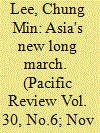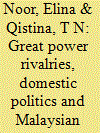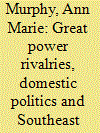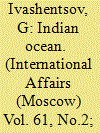| Srl | Item |
| 1 |
ID:
155090


|
|
|
|
|
| Summary/Abstract |
This paper explores the probable causes and consequences of an Asian Paradox or the highly incongruous structure of Asia within the broader international system: at once the engine of global economic growth while at the same time, the repository of all of the world's outstanding security threats and challenges. Asia in the 21st century is going to be a key test bed of the commercial peace theory and whether the U.S.-China strategic rivalry will result in some type of a conflict. Attention is also paid to the potential consequences flowing from the end of Asia's Meiji era or when all of Asia's major powers and key middle powers have achieved or are well on their way of achieving what Japan accomplished by the late 1890s: a wealthy economy and a strong military. How an increasingly wealthy, technologically advanced, and a militarily sophisticated Asia decides to cope with numerous security dilemmas is Asia's new Long March including the extent to which the region's strategically consequential states are willing to preserve and to strengthen the prevailing liberal international order.
|
|
|
|
|
|
|
|
|
|
|
|
|
|
|
|
| 2 |
ID:
155396


|
|
|
|
|
| Summary/Abstract |
China’s rise has led analysts to look for signs that Southeast Asian states like Malaysia are bandwagoning with Beijing. Following Malaysian Prime Minister Najib Razak’s 2016 visit to Beijing where significant economic and defense agreements were signed, some argued that Malaysia was tilting toward China. This article argues that Najib’s visit does not represent a major shift toward China. Malaysia has been deepening its political and security ties with other countries, particularly the United States, in an attempt to hedge its bets and maintain its traditional independent stance. China’s assertiveness in the South China Sea and willingness to intervene in Malaysia’s domestic politics are raising concerns about China among some elements of the Malaysian elite, thereby creating potential obstacles to a further strengthening of the Sino-Malaysian relationship.
|
|
|
|
|
|
|
|
|
|
|
|
|
|
|
|
| 3 |
ID:
155394


|
|
|
|
|
| Summary/Abstract |
Southeast Asian states increasingly face a strategic environment characterized by rising Sino-American tensions at the same time that domestic factors are increasingly influencing foreign policy. In recent decades, Southeast Asian states have sought to maintain their strategic autonomy by adopting hedging strategies to secure economic and security benefits from different partners. Since hedging is a rational response to strategic uncertainty, one would predict that as China’s assertiveness in the South China Sea has made clear its intentions to revise the status quo in ways that directly threaten the national interests of the Philippines Vietnam, Malaysia, and Indonesia, that they would begin to balance against China, in part by improving ties with Washington. In contrast to these predictions, no Southeast Asian country is balancing against China today, partly because of the economic incentives offered by China and partly because of the disincentives created by US pressure on democracy and human rights. In the Philippines, Duterte’s strategic re-orientation away from the United States toward China was triggered partly by US condemnation of his bloody war on drugs while US criticism of Thailand’s military coup has weakened the alliance. The unprecedented role of public pressure, interest groups and legislatures is forcing Southeast Asian leaders to publically debate policy decisions long made in private. Public opinion in Southeast Asia has often been anti-American but anti-Chinese sentiment is rising. As domestic and foreign policy becomes increasingly intertwined, Southeast Asian foreign policy is likely to continue to deviate from structurally based alignment predictions and become more erratic.
|
|
|
|
|
|
|
|
|
|
|
|
|
|
|
|
| 4 |
ID:
138483


|
|
|
|
|
| Summary/Abstract |
The world's main region of oil and gas extraction; the world's busiest trade route; the only year-round route between Russia's European part and its Far East; the home region of Afghanistan and Iraq, the seats of the largest armed conflicts, and of Iran, the target of Western attacks for over three decades - now the Indian Ocean and its littoral zone is an entanglement of numerous problems. Some of the local states cannot boast domestic stability while pirates have made the coastal waters of the Horn of Africa and the Strait of Malacca very dangerous.
|
|
|
|
|
|
|
|
|
|
|
|
|
|
|
|